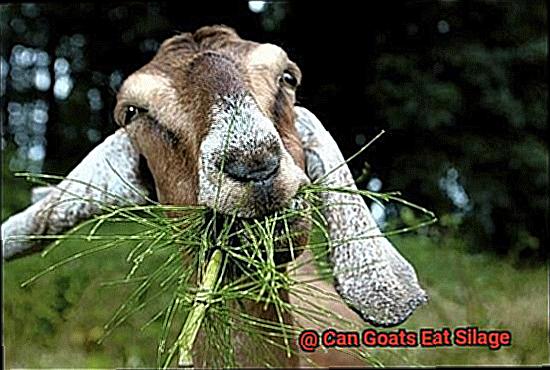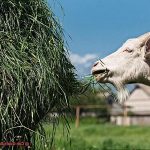Are you new to the world of livestock farming and wondering what to feed your goats?
While hay, fresh grass, grains, and pellets are all popular options, you might be curious about silage. Can goats eat it?
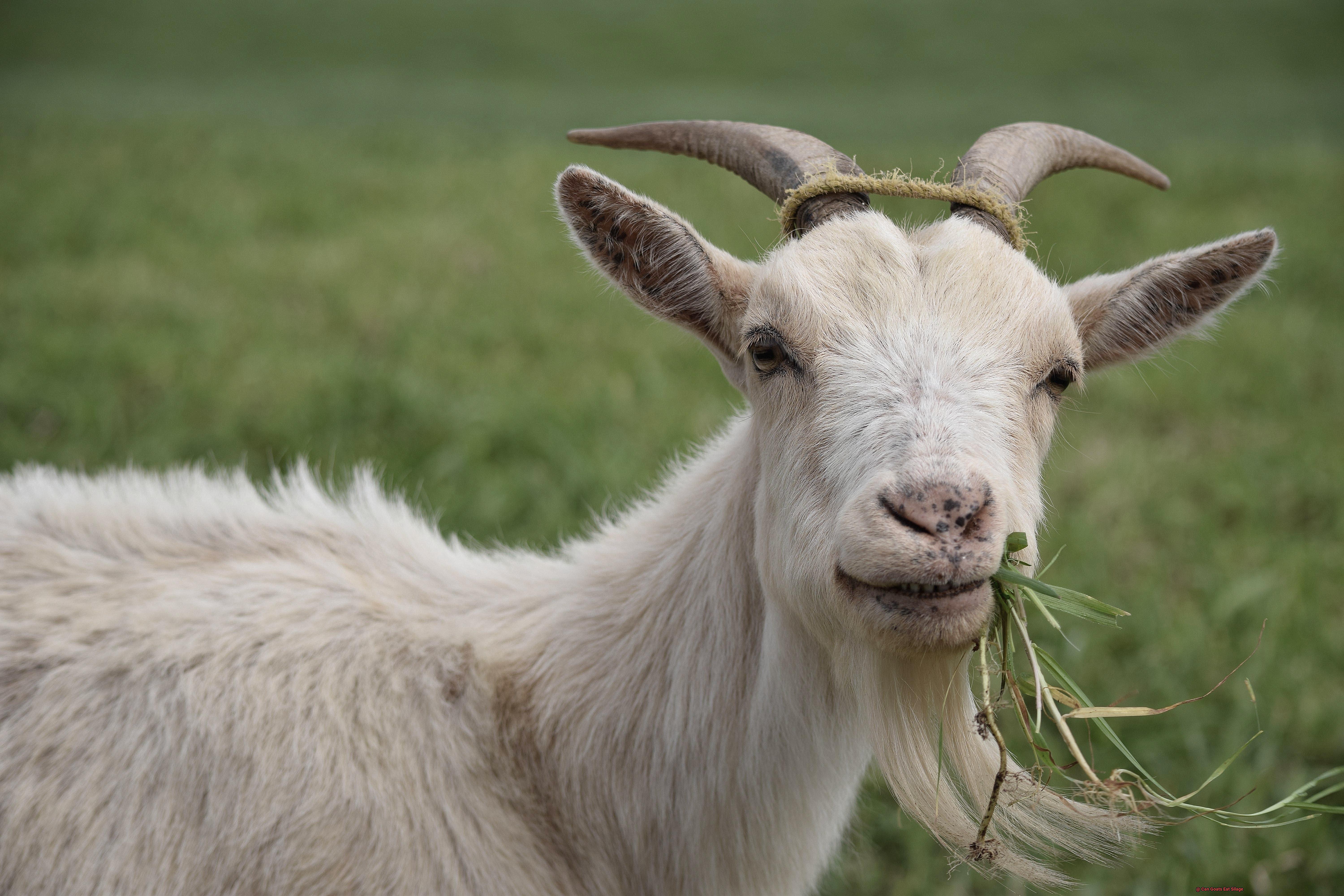
Silage is a type of fermented feed made from crops like corn, grass, or alfalfa. Typically used as a winter feed for cattle, many farmers have debated whether goats can also enjoy it.
Let’s explore this topic in more detail. Firstly, the answer is yes – goats can eat silage and even thrive on it if done properly.
However, there are a few things to keep in mind before introducing silage to your goat’s diet. Quality is key when it comes to silage.
If not fermented correctly, mold growth and other health issues can arise for your goats. It’s crucial to ensure that the silage is not contaminated with harmful bacteria or fungi.
Additionally, age and condition play an important role in determining if silage is suitable for your goats. Younger goats may struggle with digesting silage while older ones may require more fiber to maintain their health.
So, let’s find out.
Can Goats Eat Silage?
Contents
Silage, a fermented feed made from crops like corn, grass, or alfalfa, is often used to provide winter nutrition to livestock, including goats.
However, before feeding your goats silage, it’s crucial to understand the risks and nutritional needs of your goats. One of the major concerns with feeding goats silage is the risk of mold and mycotoxins.
If the silage is not fermented correctly, it can contain harmful toxins that can lead to respiratory problems and even death in severe cases. To avoid such risks, ensure that the silage is properly fermented and stored before introducing it to your goats.
Furthermore, the nutritional value of silage should be considered. Although it can be a good source of energy and protein for some livestock, it may not provide all the essential nutrients that goats require.
Goats have unique nutritional needs and require a balanced diet that includes fiber, protein, and minerals. Depending on the type of silage and how it’s processed, it may not fulfill all these requirements.
It’s always advisable to consult a veterinarian or livestock nutritionist before introducing any new feed to your goats’ diet. They can help you determine whether silage is an appropriate option for your goats and recommend any necessary modifications to ensure their nutritional requirements are being met.
They can also advise you on proper storage and handling techniques to avoid any potential health hazards.
Benefits of Feeding Goats Silage
This highly beneficial feed option offers several advantages that can help to maintain the health and productivity of your goats. Firstly, silage is made from high-quality forage crops that are harvested at their peak stage of growth and preserved using an anaerobic fermentation process.
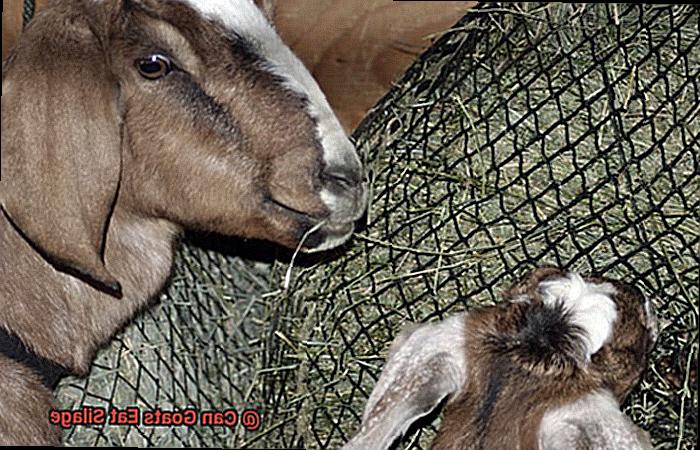
This unique preservation method helps to retain the nutritional value of the forage, making it a highly nutritious feed option for your goats. With silage, you can rest assured that your goats are getting the necessary nutrients to thrive.
Secondly, silage can be stored for long periods, making it an ideal feed option for goat owners who want to ensure a steady supply of feed throughout the year. Additionally, silage can be made from a variety of forage crops, providing goat owners with more options when it comes to feed availability. With silage, you can have peace of mind knowing that your goats always have access to a consistent and varied diet.
Thirdly, silage is easier for goats to digest compared to dry hay as it has a higher moisture content and is more palatable. This can help to improve feed intake and nutrient absorption in goats, leading to better overall health and productivity. With improved digestibility, your goats will be able to extract more nutrients from their feed, ensuring they are getting the most out of every meal.
Lastly, feeding silage in a controlled manner using a feeder or trough can help to reduce feed wastage and save on feed costs. Any leftover silage can be fed to other livestock species or used as fertilizer.
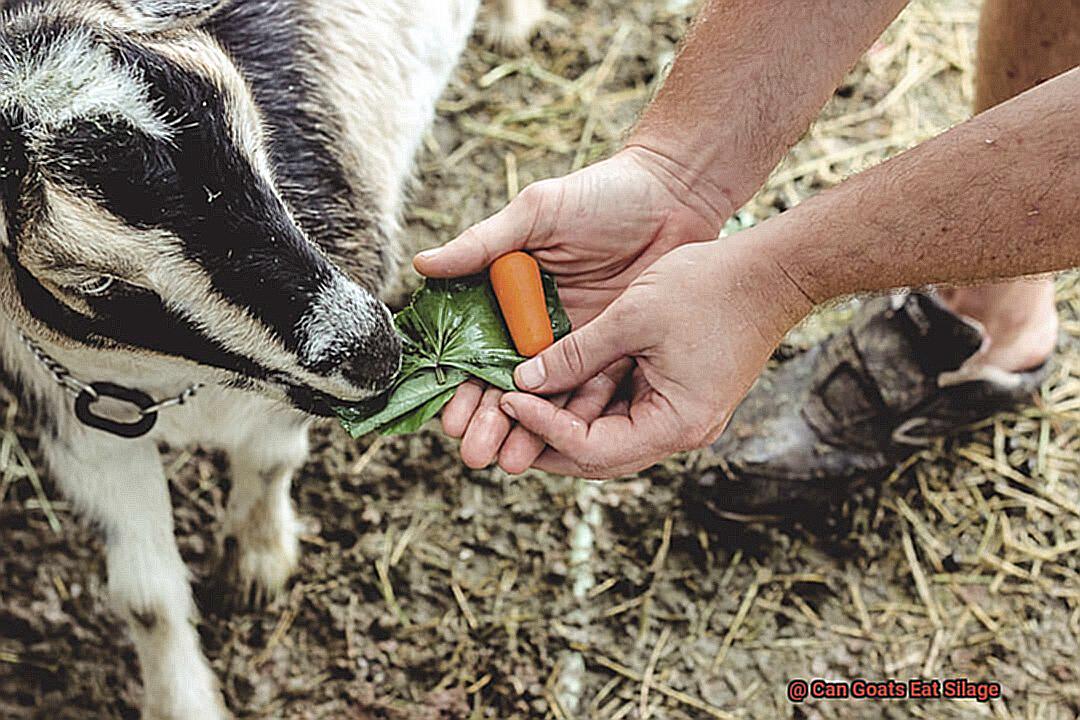
With reduced wastage and cost savings, you can ensure that your goat farming operation remains sustainable and profitable. In conclusion, feeding goats silage offers several benefits such as increased nutrition, improved digestibility, and reduced feed wastage.
Remember to consult with a veterinarian or livestock nutritionist before introducing any new feed into your goat’s diet.
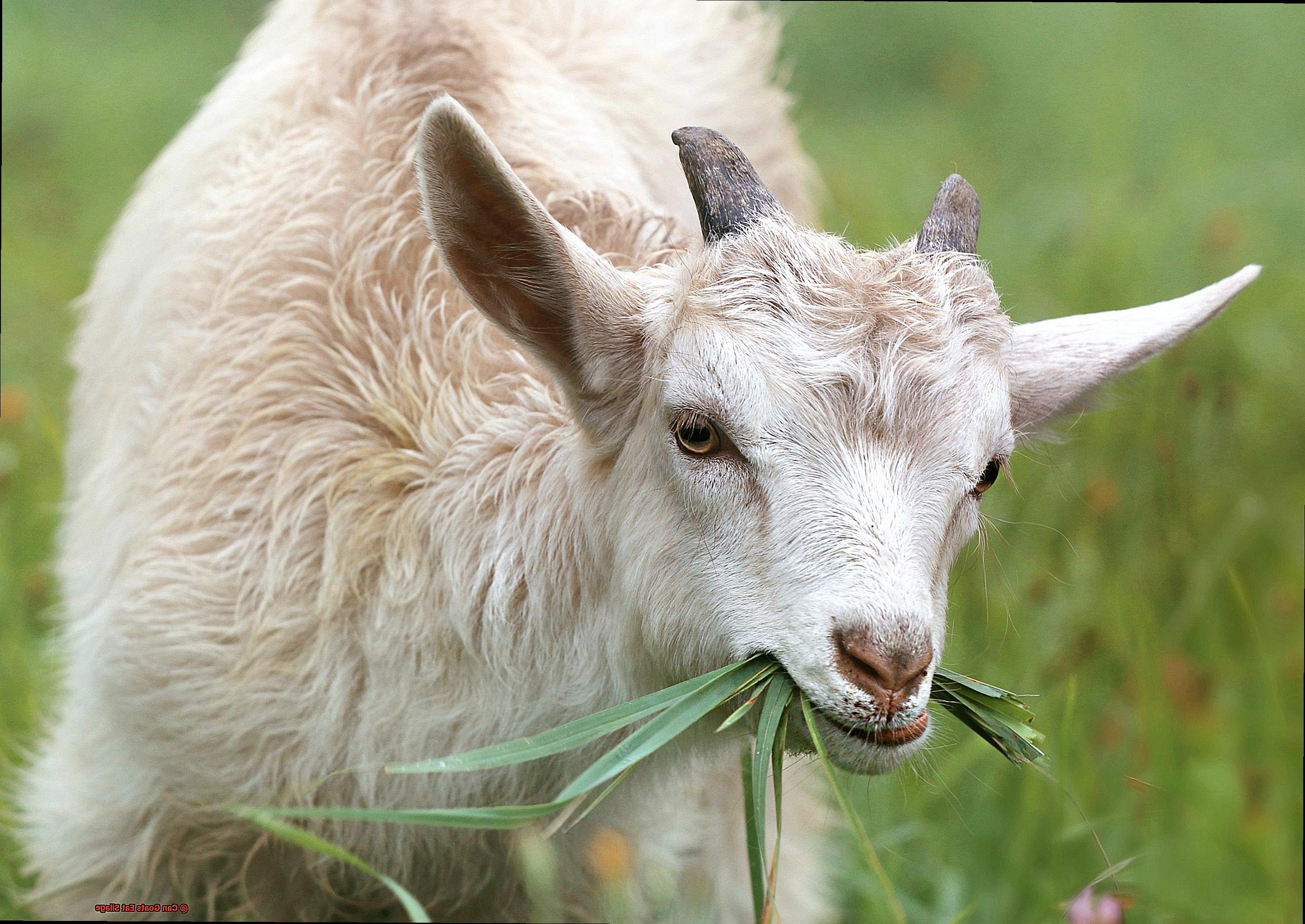
Risks of Feeding Goats Silage
When it comes to feeding goats, many people turn to silage as a reliable and nutrient-rich option.
While there are certainly benefits to this type of feed, it’s crucial to understand the potential risks that come with feeding goats silage. One of the most serious risks associated with silage is botulism.
This type of food poisoning is caused by a toxin produced by the Clostridium botulinum bacterium, which thrives in anaerobic conditions like those found in silage. If goats consume contaminated silage, they can suffer from severe illness or even death.
That’s why it’s essential to take extra precautions when feeding goats silage and ensure that it has been properly fermented and stored. Another potential danger is mold and mycotoxin contamination.
Silage that hasn’t been fermented or stored correctly can develop mold, which produces mycotoxins that are poisonous to goats. These toxins can cause a range of health issues, including digestive problems, liver damage, and immune system suppression.
To avoid these risks, it’s essential to monitor your silage carefully and dispose of any moldy or contaminated feed. In addition to these health risks, feeding goats too much silage without access to other sources of nutrition can lead to nutritional imbalances.
While silage is high in energy, it’s lacking in protein and other essential nutrients like vitamins and minerals. If goats aren’t getting a balanced diet, they can suffer from malnutrition or other health problems.
Check your feed regularly for signs of mold or contamination, and supplement your goats’ diet with additional sources of protein and nutrients as needed.
Types of Silage Appropriate for Goats
Silage is a fantastic feed option for livestock, and goats are no exception.
However, not every type of silage is suitable for these finicky eaters. In this section, we’ll explore the five types of silage that are appropriate for goats and how to make sure they’re fed the right way.
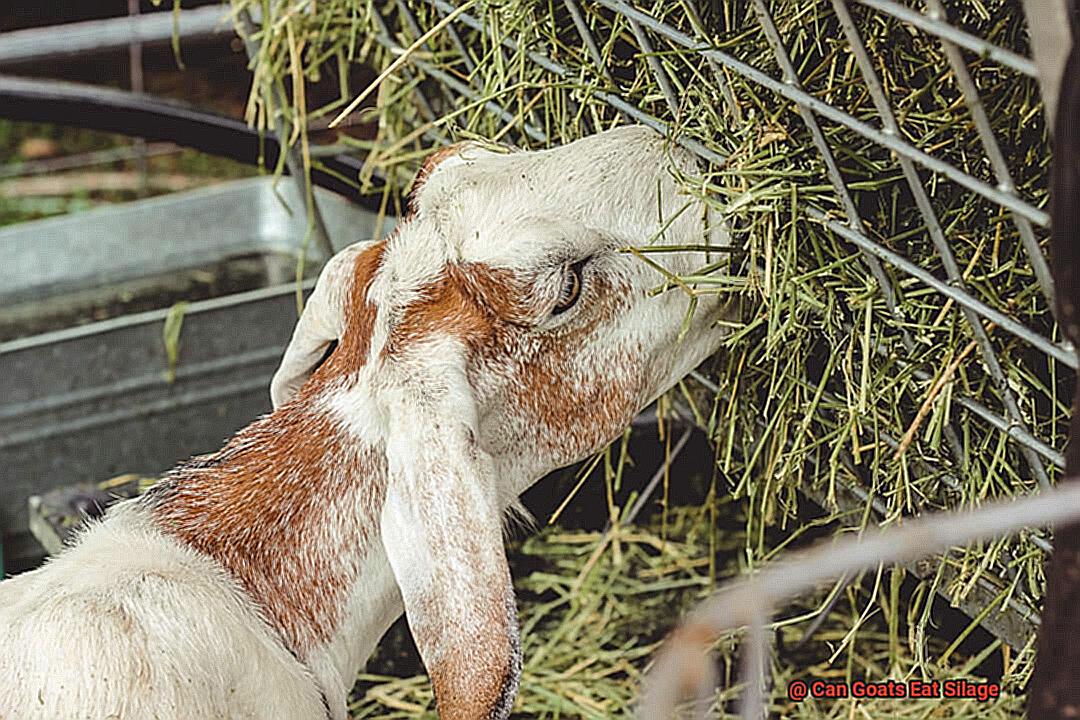
Corn Silage
First on the list is corn silage, a widely used silage for goats. It’s made by ensiling the entire corn plant, including the stalks, leaves, and ears.
Corn silage is packed with energy and nutrients that can keep goats healthy and happy. However, it’s important to remember that timing is everything.
Harvesting the corn at the right stage of maturity will ensure that it’s digestible for your goats.
Grass Silage
Grass silage is made by ensiling grasses such as ryegrass or clover.
Grass silage is an excellent source of fiber and protein that can help maintain your goats’ health. To make sure your grass silage has enough nutrients, you need to harvest it at the right stage.
Legume Silage
Legumes such as alfalfa or clover are high in protein and other essential nutrients that goats need to thrive.
Just like with corn and grass silage, it’s critical to harvest legumes at the right stage to prevent digestive issues. Another type of silage that goats love is haylage, which is made from chopped and ensiled hay.
Haylage provides a good source of fiber for your goats and can provide adequate nutrition if harvested at the right stage. Lastly, sorghum silage is a nutritious option made from sorghum plants that can provide goats with energy and nutrients.
However, it’s important to harvest sorghum at the right stage to prevent digestive issues.
How to Store and Handle Silage Safely
Silage is a popular feed choice for goats, but it can pose some health risks if not handled and stored properly. To ensure your goats’ safety, here are five crucial tips for safely storing and handling silage.
Use Airtight Containers
Silage should always be stored in airtight containers like silos or bunkers. This will prevent air exposure, which can lead to spoilage or the growth of harmful bacteria and microorganisms.
By using airtight containers, you’ll maintain the nutritional quality of the silage and keep it fresh for longer.
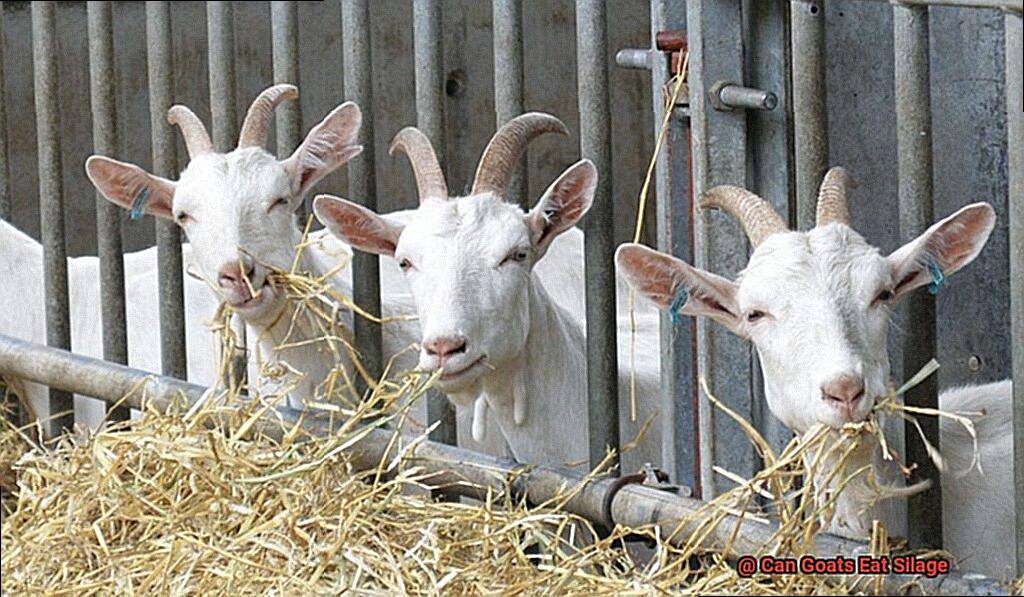
Keep Silage Dry
Moisture is the enemy of silage. If it becomes too wet, it can quickly spoil, leading to significant losses. It’s essential to keep silage dry during storage and handling to avoid any health risks.
You can achieve this by using appropriate storage structures that protect the feed from moisture.
Use Appropriate Equipment
When handling silage, it’s crucial to use appropriate equipment like loaders or forklifts that can handle the weight of the bales or bags. Using improper equipment can lead to accidents or damage to the silage.
Always make sure to use equipment that is well-suited for the weight and size of your silage.
Store Silage Away From Other Feeds
To prevent contamination, store your silage away from other feeds, especially those that are prone to attracting pests or rodents. This prevents contamination from other feeds or pests that may cause harm to your goats.
Monitor Temperature
Silage should be monitored regularly for temperature changes. Sudden rises in temperature could signal spoilage or fermentation, which can lead to mold growth and nutrient loss. Regular monitoring will help you catch any issues before they become major problems.
By following these tips, you’ll ensure that your silage remains safe for your goats to eat.
Remember that safety is always the top priority. It’s better to take preventive measures than to deal with the consequences of poorly stored and handled silage. Don’t forget to consult with a veterinarian or animal nutritionist before introducing new feeds to your goats’ diet.
Consulting with a Veterinarian or Animal Nutritionist
When it comes to feeding them silage, seeking advice from a veterinarian or animal nutritionist can make all the difference.
These experts have in-depth knowledge and experience when it comes to animal health and nutrition, and can provide valuable insights into your goats’ nutritional needs.
One of the primary advantages of consulting with a veterinarian or animal nutritionist is that they can help you determine the appropriate amount of silage to feed your goats.
Factors such as their age, weight, and activity level all play a role in determining the right amount of silage they should consume.
Overfeeding or underfeeding can lead to health issues down the line, but with professional guidance, you can rest assured that your goats are getting the right amount of nutrition.
In addition to recommending the appropriate quantity of silage, veterinarians and animal nutritionists can also advise on the best types to feed your goats. Different types of silage have varying nutritional values, so it’s vital to choose the right type for your goats’ specific needs.
These professionals may also suggest supplements or additional feed that can further enhance your goats’ diet and overall health.
Another significant benefit of consulting with a veterinarian or animal nutritionist is that they can identify any potential health issues that may be affecting your goats.
Regular physical exams and blood tests can detect any deficiencies or other health problems that may arise from improper feeding or care. By catching these issues early, you can treat them promptly and avoid any long-term consequences.
OsVzXrEQX5Q” >
Conclusion
In conclusion, goats can certainly eat silage, but it’s important to take the necessary precautions and understand your goats’ nutritional needs.
Silage offers several benefits, including increased nutrition, better digestibility, and reduced feed wastage. However, farmers need to ensure that they properly ferment, store and handle silage to avoid any potential health risks such as botulism or mold contamination.
It’s always a good idea to consult with a veterinarian or animal nutritionist before introducing silage into your goats’ diet. They can help you determine if it’s appropriate and recommend any necessary modifications to meet their nutritional requirements.
When storing and handling silage safely, there are a few key things to keep in mind. Use airtight containers, keep the silage dry, use proper equipment and store it away from other feeds to prevent contamination.
Regularly monitoring the temperature of the stored silage is also crucial. Overall, feeding goats with silage requires careful consideration of their unique nutritional needs and proper storage practices.

